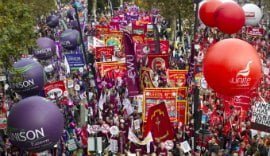On Wednesday 27th November, around 50 people came to a Coventry TUC public meeting on austerity and the fight back. Speakers from various unions and local groups discussed the impact of the cuts in Coventry and nationally. Darrall Cozens, UCU delegate to the Coventry TUC, reports on the meeting and provides a statement by the Coventry TUC on the Coalition’s austerity and how to fight it.
On Wednesday 27th November, around 50 people came to a Coventry TUC public meeting on austerity and the fight back.
Four speakers occupied the platform. Kalwinder Sandhu from Coventry Women’s Voices showed in great detail how the cuts were disproportionately affecting Black and Ethnic Minority members of society. For example, in Coventry 75% of Pakistani and Bangladeshi children at the age of seven live in poverty, as do 50% of Afro-Caribbean children. Some 40% of households affected by the benefit cap come from minority ethnic families.
Nick Makin from NAPO, the probation officers union, spoke on the privatisation of probation services, where contracts worth about £450m of public money were being handed out to private companies for periods of between 7-10 years. These companies include the likes of G4S and Serco who are, it is said, under investigation for having defrauded the government for claiming money for work they had not done. G4S had even offered to repay £40m but this was refused by the National Audit Office as being insufficient.
Sian Lloyd from the CYWU section of Unite graphically illustrated the effects of the cuts on Youth Services in Coventry and emphasised the point that in the early 1980s a Tory government under Thatcher threw millions of pounds at youth services after the uprisings of disaffected youth in British cities in 1981. At that time the government worked on the principle that the devil makes work for idle hands, so unless youth were occupied in youth clubs, there could be more uprisings. Today, with the objective situation of youth unemployment echoing the early 1980s, the response nationally and locally has been to cut funding to youth services and close youth clubs.
Nick Harrison from the FBU explained that in the West Midlands the grant for the fire service will have been cut by 26% between 2011 and 2015 and further cuts of 28% are projected for the period 2015 to 2018. He said that although we are supposed to live in a democracy, public consultation on the cuts had been overwhelmingly against the cuts, yet they were still driven though. What has that meant? There is a recruitment freeze so that staffing numbers can be reduced through natural wastage as fire fighters leave or retire. Many admin posts have been cut so that in the evening the only lights on in the Westmids HQ are those in the offices of the fire brigade chief, Human Resources and, tongue in cheek, the office that carries out disciplinary procedures.
Nick also highlighted the waste of public money that takes place. For example, some £0.5bn was spent on a new computer system and 12 new building were constructed to house it. The system has never worked and the buildings have not been used, yet some £4m annually is spent on them. The “burning” issue, however, is that of pensions. By 2015 fire fighters will be paying 14.5% of their salary into the pension fund as they are made to work on the job until they are 60. And if they can no longer do the job, they can be forced to retire early on capability grounds and will then lose a large chunk of their pension entitlement with some receiving as little as £9,000 per year in a pension. Fittingly, Nick ended by stating, “We save people, not banks!”
The final speaker, Sarah Feeney from Unison, told the audience that despite the cuts that have taken place, the debt was still rising by £3,000 every second. The future for local government and local services can be seen by what is happening in Shropshire where 300 workers will be kept on the council payroll and the rest will be TUPEd out to private providers. Furthermore, up until now, job cuts in Coventry City Council had been achieved through voluntary redundancies or early retirement, however, future cuts put compulsory redundancies on the cards.
Speakers from the floor spoke passionately about the campaign against the Bedroom Tax and the need for both an industrial and political fight to halt this austerity programme of the government. A lot of criticism was also reserved for the Labour Party, as a lot of the Coalition’s cuts programme has been built on measures that were introduced by Labour when they were they were in office. It is for that reason that many activists in the labour movement can see no difference between the policies of the Tories, the Lib Dems and Labour.
The final speaker from the floor – the author of this report and UCU delegate to the Coventry TUC – presented to the meeting a statement drawn up by the CTUC on the need for a political solution to the crisis of capitalism that is forcing working class people to endure cuts to save capitalism. Figures that came out yesterday showed that nine million people were in serious debt and more than four million of them had been in this position for more than a year. This is not debt taken on to buy cars, pay for holidays or build home extensions. This debt is being built up so that more and more people can pay for the basic necessities of life such as food, heating or clothing. Millions are on a hand-to mouth existence. The statement below reflects where Coventry TUC stands on the issue.
A Statement on Austerity by Coventry Trades Union Council
On October 1st George Osborne threw down the gauntlet when he said that cuts in public spending will continue until at least 2020. The aim of the Tory Coalition is to create a budget surplus. In 2009-10 the deficit was £170bn and in 2013-2014 it will be £120bn.
David Cameron also stated on November 11th at the London Lord Mayor’s Banquet that austerity would continue until the budget is in balance and when that has been achieved, we will be left with a state that the economy can afford.
So despite all the cuts that have happened – the job losses, wage freezes, attacks on pensions, erosion of public services and a drastic reduction in the standard of living of working class people – the deficit has only been cut by a third. And on top of the deficit we have a debt of £1.5trn that they also want to get rid of.
The warning is there for all to see. When the deficit is eliminated whatever the state provides in the form of education, health, social services, pensions and other services will be the new normality. There will be no going back to the reforms that we have gained from our struggles in the past.
This amounts to a declaration of war on the part of those who defend a capitalist system in crisis, a system that can no longer offer the majority of UK citizens a decent standard of living. It is a declaration of war against working class people whose labour produces the wealth of this country. While those at the top of society, the bankers, financiers, and CEOs of large corporations, continue to enjoy multi-million pound salaries and bonuses, we face another decade at least of cuts without even the hope that our sacrifices will be rewarded.
The reality around us today is bad for working class people, but the future is even worse if the Coalition is not stopped. And what does a snapshot of that reality reveal?
At Grangemouth in Scotland Jim Ratcliffe, the CEO of INEOS with a personal fortune of £1.1bn, can sit on an expensive yacht in the Med and tell 800 workers and their families that they must accept a wage freeze, the abolition of their final salary pension scheme and a three-year no-strike deal, or the plants will be closed. And he moved his company to Switzerland to avoid paying £100m per year in tax, And that was after making profits of £31m in 2011 and £49m in 2012.
We also have anything between one-to-five million workers on zero hour contracts where they are contractually bound to an employer but they are not guaranteed any hours or wages.
Furthermore, we have the six big energy companies that control 98% of the energy market. Over the past four years wholesale energy costs have gone up by 3.2%, customer prices by on average 22% and profits by 73%, from £2.16bn in 2009 to £3.74bn in 2012.
And here in Coventry the young and the old will pay for a crisis that they did not cause as Surestart Centres have been closed, Youth Services are to be cut and Adult and Social care provision drastically reduced.
This reality has one common theme. To save a capitalist system in crisis we have to accept cuts in our direct wages and our social wage so that the costs of labour can be driven down and the share of wealth that goes in wages can be cut even further.
That is why we are fighting back with strikes, marches, demonstrations and other forms of struggle. But this battle will not be won purely through industrial action. We also need a political programme to put an end to the anarchy of capitalism.
That is why the Coventry TUC has consistently called for the public ownership of banking and finance as the first step to creating a new kind of society, a socialist society, where the wealth that workers produce will be socially owned. Only then can we begin to create jobs, build homes and schools and hospitals, provide a real living wage as well as decent pensions and offer our young and old real hope for the future.
And that would be the first step. We also need to bring back into public ownership the six giant energy companies, the railways, the water companies and the other giant monopolies that dominate the economy and dictate to governments. And all of these should be run under democratic control.
So we as the Coventry TUC will support all workers in their fight to defend wages, jobs, pensions and the public services that many of them provide. But we also say that so long as the capitalist system exists, we will always be under attack. That is why we also need to fight politically to end this system.






